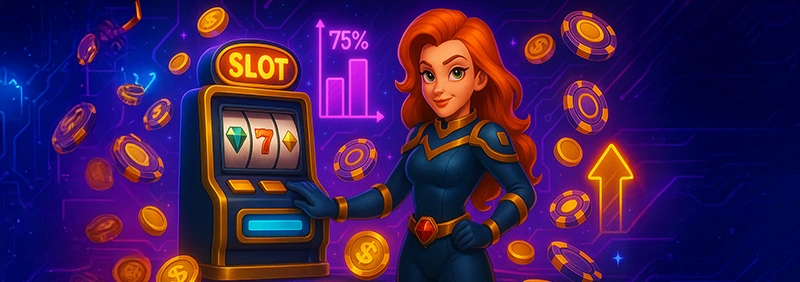Home > Casino Lab > Science of Slots > House Edge Explained: How Casinos Secure Their Long-Term Advantage
House Edge Explained: How Casinos Secure Their Long-Term Advantage
Every casino game, from slot machines to roulette and blackjack, is built on one central principle: the house edge. This mathematical concept guarantees that casinos remain profitable over time, no matter how lucky individual players may be in the short run.
For players, understanding the house edge is essential to grasping why casinos always win in the long term and how to make smarter decisions when choosing games.

What Is the House Edge?
The house edge is the statistical advantage a casino holds over players in any given game. Expressed as a percentage, it represents the average share of each bet the casino expects to keep over the long term.
For example, if a slot machine has an RTP (Return to Player) of 96%, the house edge is 4%. This means that over millions of spins, the casino will retain $4 for every $100 wagered. While individual players may experience big wins or heavy losses in the short run, the house edge ensures the casino’s profitability across all bets placed.
How the House Edge Works in Practice
The house edge is built directly into the design of casino games. In roulette, for instance, the presence of a green zero (and double zero in American roulette) shifts the odds slightly in the casino’s favor. In slots, the distribution of symbols and reel sizes is calibrated so that payouts never quite match the probabilities, ensuring the casino always has a margin.
This does not mean that winning is impossible. On the contrary, jackpots and big payouts are part of the attraction. But the mathematics guarantee that in aggregate, the house always comes out ahead. This is why casinos can afford to offer luxury resorts, bonuses, and promotions: the house edge makes profitability inevitable.
Why the House Edge Matters to Players
For players, understanding the house edge is about setting realistic expectations. A game with a 1% house edge, like blackjack with optimal strategy, gives players a better chance of lasting longer than a game with a 10% edge, such as certain slot machines or keno.
By recognizing which games have lower house edges, players can stretch their bankrolls further, enjoy longer sessions, and reduce losses. Conversely, ignoring the house edge often leads to chasing games that are mathematically stacked against them.
Common Misconceptions About the House Edge
One major misconception is that the house edge applies to short-term play. In reality, it is a long-term average calculated across millions of bets. A player may sit down at a high-edge slot and win big in just a few spins—but over time, the math ensures the casino retains its advantage.
Another misunderstanding is that casinos can manipulate the house edge in real time. In regulated environments, games are audited and certified to operate with fixed house edge percentages. The casino’s advantage is structural, not arbitrary.
The Future of House Edge in iGaming
As online gambling evolves, transparency around house edge is becoming more important. Many casinos now display both RTP and house edge directly within game information, empowering players to make informed choices. In Web3 casinos, smart contracts and provably fair algorithms may make house edges fully auditable, giving players unprecedented visibility into the math behind the games.
By 2030, the concept of house edge will remain central to casino economics, but players will likely demand clearer disclosures and tools that help them balance risk with entertainment.
Conclusion
The house edge is not a trick or a secret—it is the foundation of how casinos operate. By ensuring a built-in margin, it guarantees profitability for operators while shaping the odds for players. For gamblers, understanding the house edge means recognizing that while luck may bring short-term wins, the math always favors the house in the long run.
The smartest players use this knowledge to pick games wisely, manage their bankrolls, and approach gambling as entertainment rather than a guaranteed profit.

